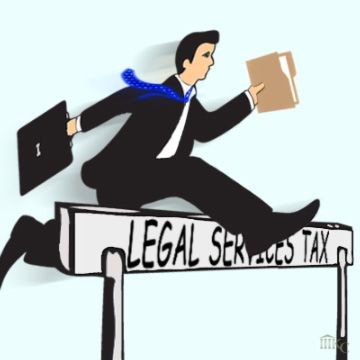The Lawyer's Lawyer
Taxation of Representation
Q. Licensed in Maryland and the District of Columbia, I find it challenging to represent consumers and small businesses that can't afford the legal fees of my competitors. If Maryland puts a tax on legal services, how would that impact my clients and my practice?
A. Fortunately for you, Maryland recently followed many other jurisdictions in rejecting proposals to impose a "professional services tax." But for lawyers in all states, there are important reasons to lobby hard against any future efforts to impose taxation on representation.
Any state that passes such a tax would subject lawyers to additional administrative burdens, greater overhead, and less profit on fewer clients.
As states seek ways to eliminate economic obstacles for those seeking representation, taxing legal services would make it more difficult for those seeking access to justice.
For example, had Maryland imposed a 5% tax on legal services:
➤ Lawyers charging a very competitive hourly rate of $250 will cost their clients $262.50. Every ten hours billed will add an extra $125.00 to their invoices;
➤ The seriously injured client who settles for insurance policy limits of $300,000 would net significantly less if the State taxes her lawyer's $100,000 contingency fee. Beyond liens for medical treatment, expert witness costs and other expenses of representation, subtract an additional $5,000 from her recovery;
➤ The State giveth and the State taketh away. Although legislators recently doubled the Maryland Tort Claims Act damages cap to let victims recover up to $400,000 against the State, those that do would have had to pay some of their limited recovery back to the State as taxes on their lawyers' contingency fees; and
➤ Beyond taxes on legal fees themselves, services rendered by expert witnesses, private investigators, private process servers, court reporters and a range of other professionals would add further taxes to client bills.
If you also retain outside professionals to assist with business operations, this tax would have increased your own overhead, reduced your profit margin, and placed additional pressure on you to raise hourly rates. This would hit you, other small firms and sole practitioners especially hard. Those practicing in smaller settings frequently outsource services which large firms handle in-house. If you hire others to assist with clerical and paralegal needs, use a payroll service or retain human resources and pension consultants, you'd have to tack on another 5% to the cost of doing business with the help of outside contractors.
Ironically, the professional services tax itself would increase your own need for professional services – from accountants, bookkeepers and other tax professionals. Beyond your additional accounting and remittance obligations, the multi-jurisdictional nature of your law practice adds a layer of complexity that may be tough to navigate.
Unlike the sale of discrete goods, lawyers who are licensed to represent clients in other states may have difficulty determining the extent to which their services fall within or outside of the geographic scope of a particular jurisdiction's taxing authority. Sorting this out may give rise to tax audits which seek the disclosure of sensitive or privileged information on clients whose confidentiality you must maintain. Hardly an easy tax to administer, most state legislatures that have proposed professional services taxes have rejected them as unworkable and others promptly repealed these provisions due to difficulties in enforcement.
The taxman may have been the least of your concerns had your state enacted the tax. Enter Bar Counsel. Lawyers who fail to satisfy tax obligations routinely face professional discipline. Whether through negligent mismanagement or by wilful evasion, problems in reporting or remitting income or payroll taxes have prompted public reprimands, suspensions and disbarment. An additional set of complex tax provisions would give your disciplinary board additional grounds on which to sanction those who fall short.
At a time when fewer consumers can even afford to retain counsel, taxing the legal fees incurred would penalize those seeking access to justice. While economists disagree on whether sales taxes reduce sales, few would debate the difficulties which low- and middle-income Americans face amid the skyrocketing cost of legal services. As attorney's fees rival the value of their cases, many segments of society have been forced to fend for themselves, or simply give up. Increasing their fees by 5% would increase this hardship even more.
Rather than comment on the political issues surrounding such proposals, I believe that any rational debate over the merits of taxing legal services must focus on those who will be hit the hardest – our clients. When states propose to tax their legal bills, our profession must respond by educating legislators on the importance of our work and on the critical need to enhance their access to justice in each and every state.
Originally Published: March 15, 2020 in the Maryland Bar Bulletin.
